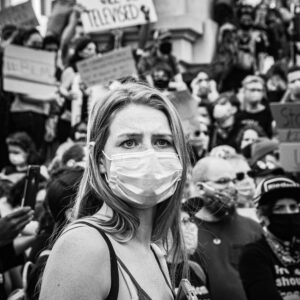I have a friend — let’s call her Karmen. She’s a young, relatively healthy Black woman. Two weeks ago, she stood up and felt an intense wave of dizziness as well as an odd sensation on the left side of her body. Karmen is no hypochondriac but the symptoms were sudden and alarming enough that she decided to visit the emergency room to be safe.
Over the course of a 24 hour hospital stay, Karmen received some of the worst medical care I’ve ever seen. I know, because I was FaceTiming with her most of the time. In one particularly disturbing moment, she sent me images of her blood splashed across the hospital bed and the floor. The professional inserting her IV made several mistakes during the procedure, and had to re-insert the IV several times. The entire time she discussed how understaffed the department was and how tired she was. She failed to insert the IV so many times that another worker replaced her. The process left Karmen literally bloodied and bruised and in new pain that she didn’t have when she entered the emergency room.
She was left in a room with no call button or access to anyone for over sixteen hours. There was no television or any other amenities. When staff finally did return to her, she asked for ice and pain medication for a headache. Her request was never fulfilled. If that wasn’t bad enough, the staff told her that they’d lost her blood. They had to subject her to more painful bloodwork. She asked when she would be able to go home but was only told that she was being kept for observation.
Her worst experience was yet to come though. The hospital staff ordered an MRI for her, which was continually delayed. When she was finally brought in for the procedure, the staff had difficulty inserting the IV again. Karmen informed the staff that something felt off about the placement of the IV, but they told her it was fine. When they administered the chemical for imaging in the MRI, Karmen told them it felt like “fire shooting through her veins.” Their response was that she was “sensitive.” She informed them that she’d had MRIs in the past and they didn’t hurt like this.
When she entered the MRI tube, the pain intensified to the point that Karmen was screaming and crying, and pressed the emergency button to end the MRI. When the staff asked her what was wrong, she repeated herself: something felt wrong with the IV and the MRI was extremely painful. Instead of correcting the IV or starting the procedure again from scratch, the staff asked her to endure the pain. They placed her back in the MRI tube three more times- twice to finish the imaging, and a third time because Karmen was shaking from the pain so much that they had to re-image her.
After all of this, the staff had no answers for what had caused her initial symptoms. They referred her to a neurologist and sent her home.
Before you dismiss this as an isolated incident, Karmen’s experience is illustrative of years of research which show that Black women are treated worse than other patients when receiving medical care. The issues they face are compounded by the intersectionality of their identity. To paraphrase Claudia Jones, Black women face double oppression in their treatment because of biases against Black patients and women.
For example, a 2016 study showed that half of the study’s sample of white medical students believed that biological differences between Black and white people meant that Black patients experienced less pain than white patients. These unfounded and incorrect assumptions lead to medical professionals prescribing less powerful pain medication, ignoring or downplaying symptoms, and even declining certain treatment options for Black patients. A similar study showed that women who entered an emergency room for intense abdominal pain were less likely to receive opioids or other pain medication to treat their condition. If they did receive medication, they were forced to wait longer than men to receive treatment.
The disregard that Black women face in medical treatment is doubly destructive. First, they experience unnecessary pain and suffering during their visits, when they’ve sought medical care for relief. Negative experiences lead to Black women choosing not to seek care, which leads to the second destructive outcome of illness and injuries being untreated. Both of these results decrease quality of life and life expectancy.
It’s not enough that the medical profession acknowledge the discrimination that Black women face — the data about their experiences has been available for years. Medical professionals need to do the necessary work of dispelling biased assumptions, training staff to be attentive and responsive to patients when they speak, and respecting the shared humanity of everyone who seeks care. Karmen should not have had the painful experience she had and it’s time to get to work to ensure that a future visit is less traumatizing.
Jamil Ragland is a writer from the Hartford area. His work deals with politics, race and culture. Jamil lives in Hartford with his son.






